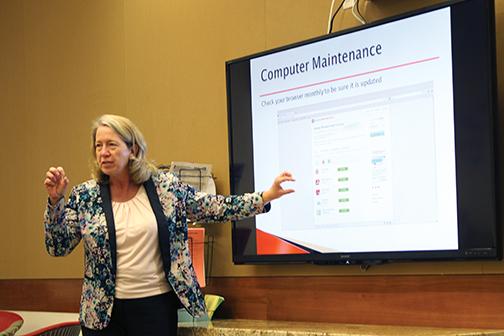San Diego State’s Information Security Officer gave a presentation on avoiding fraud and identity theft last Thursday at the Student Life and Leadership office in the Conrad Prebys Aztec Student Union.
Felecia Vlahos first stressed that there is a difference between fraud and identity. Fraud is the act of deception for financial or personal gain, such as when an individual uses someone else’s credit card or forges checks. Identity theft is defined as the act of obtaining someone’s identification data for personal or economic gain, such as when an individual applies for a new credit card in someone else’s name or establishes a new address in another person’s name.
Vlahos said being a victim of fraud and identity theft can be avoided by taking basic precautions, and described three mistakes she sees people make consistently.
“People reuse their passwords, click on anything online and always put up a picture on some social media network showing where they are when they go out,” Vlahos said.
Vlahos recommends passwords be more than 10 characters long, have upper and lower case letters, and include numbers and special characters. She said she realizes it is hard to keep track of passwords and encourages people to write down their usernames and passwords, but to be sure that they kept it in a safe place.
Seeing ads or links that show up on websites can be tempting to click on, but Vlahos recommended thinking twice. Often those ads are links to malicious websites that Vlahos said can infect your computer.
The practice of sharing a location on social networks is a common practice, but Vlahos cautioned against this.
“When you put up that you are somewhere else other than your home, it can be an invitation to potential thieves to go to your home and take what they want,” Vlahos said.
She also recommended using anti-virus software on your computer. Students in campus housing can download free anti-virus software from RezCon, computer support specialists for students in dorms. Those living off campus should check with their Internet service providers to receive free anti-virus software.
Freshman Linda Dawood attended the presentation, which impressed upon her the importance of being aware online. She said she plans on implementing several things she learned at the presentation.
“My dad’s credit card was compromised once, and I don’t want that to happen to me,” Dawood said.
Vlahos said she doesn’t want people to feel unsafe because of the threat of fraud or identity theft, but to be aware and safe.
“Be empowered,” Vlahos said. “Don’t feel like you can’t do things online, but enjoy yourself and be safe. Just be aware and wise. Just like all the other crimes we see on the news and we are warned to be aware of our surroundings, we need to be aware of what is going on around us online.”










